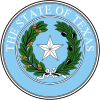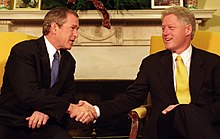 | |
| Governorship of George W. Bush January 17, 1995 – December 21, 2000 | |
| Governor | George W. Bush |
|---|---|
| Party | Republican |
| Election | |
| Seat | Governor's Mansion |
| ← Ann RichardsRick Perry → | |
 Seal of Texas | |
| ||
|---|---|---|
|
Business and personal
46th Governor of Texas 43rd President of the United States
Tenure
Policies Appointments Presidential campaigns 
 |
||
George W. Bush served as the 46th governor of Texas from 1995 until 2000, when he resigned as governor amid his transition into the U.S. presidency after having been elected president in the 2000 United States presidential election. As governor, Bush successfully sponsored legislation for tort reform, increased education funding, set higher standards for schools, and reformed the criminal justice system. Bush also pioneered faith-based welfare programs and helped make Texas the leading producer of wind powered electricity in the U.S.
1994 gubernatorial election
Main article: 1994 Texas gubernatorial electionWith his father George H. W. Bush's election to the United States presidency in 1988, speculation had arisen among Republicans that George W. Bush would enter the 1990 Texas gubernatorial election. This was offset by Bush's purchase of the Texas Rangers baseball team and personal concerns regarding his own record and profile. Bush later declared his candidacy for the 1994 election, the same election cycle that his brother Jeb first sought the governorship of Florida. Winning the Republican primary easily, Bush faced incumbent Governor Ann Richards, a popular Democrat who was considered the easy favorite, given Bush's lack of political credentials.

Bush was aided in his campaign by a close coterie of political advisers that included Karen Hughes, a former journalist who was his communications adviser; Joe Allbaugh, who became his campaign manager, and Karl Rove, a personal friend and political activist who is believed to have been a strong influence in encouraging Bush to enter the election. Bush's aides crafted a campaign strategy that attacked Governor Richards' record on law enforcement, her political appointments, and her support of liberal political causes. Bush developed a positive image and message with themes of "personal responsibility" and "moral leadership." His campaign focused on issues such as education (seeking more accountability for schools over student performance), crime, deregulation of the economy, and tort reform. In the course of the campaign, Bush pledged to sign a bill allowing Texans to obtain permits to carry concealed weapons. Richards had vetoed the bill, but Bush signed it into law after he became governor.
Following an impressive performance in the debates, Bush's popularity grew. He won with 54.1 percent against Richards' 45.9 percent.
1998 gubernatorial election
Main article: 1998 Texas gubernatorial electionAs a popular governor, Bush won re-election in a landslide victory with nearly 69 percent of the vote.
He won 49 percent of the Latino vote and 27 percent of the African American vote, becoming the first Texas governor to be elected for two consecutive terms since Dolph Briscoe was re-elected in 1974. Within a year, he had decided to seek the Republican nomination for the Presidency.
Policies
Capital punishment
Bush presided over 152 executions, more than any previous governor in modern American history; critics such as Helen Prejean argue that he failed to give serious consideration to clemency requests. The only death sentence Bush commuted to life imprisonment was for serial killer Henry Lee Lucas because of lingering doubts about his guilt in the so-called "Orange Socks" (identified in 2019 as Debra Jackson) murder in Georgetown, Texas in 1979.
Fiscal
Seeking to reduce high property taxes to benefit homeowners while increasing general education funding, Bush sought to create business taxes, but faced vigorous opposition from his own party and the private sector. Failing to obtain political consensus for his proposal, Bush used a budget surplus to push through a $2 billion tax-cut plan, which was the largest in Texas history and cemented Bush's credentials as a pro-business fiscal conservative. To pay for the tax cuts, he sought federal approval of a plan to privatize Texas' social services.
Bush also helped make Texas the leading producer of wind powered electricity in the U.S. In 1996, Bush made wind power a key facet of Texas' renewable energy policy. Under a 1999 Texas state law, electric retailers are obliged to buy a certain amount of energy from renewable sources (RPS), This environmentally progressive legislation is a counterpoint to the energy policies of his presidency that favored the status quo.
Social
Bush also extended government funding for organizations providing education on the dangers of alcohol and drug use and abuse, and helping to reduce domestic violence. As governor, he reached out to religious leaders such as Kirbyjon Caldwell (who would later offer the official benediction at Bush's presidential inauguration). He signed a memorandum on April 17, 2000 proclaiming June 10 to be Jesus Day in Texas, a day where he "urge all Texans to answer the call to serve those in need." Although Bush was criticized for allegedly violating the Establishment Clause of the First Amendment ("Congress shall make no law respecting an establishment of religion"), his initiative was popular with most people across the state, especially religious and social conservatives. In the 1996 United States presidential election, Bush criticized Republican nominee Bob Dole for trying to bring Pro-choice advocates into the party.
Education
| This section needs expansion. You can help by adding to it. (December 2013) |
Bush supported local control of schools, higher educational standards, and an updated academic curriculum. Charter schools mired in financial scandals. There were protests against one test determining a child's promotion.
Appointments
| This section needs expansion. You can help by adding to it. (December 2013) |
Right after his re-election, Bush named insurance commissioner Elton Bomer, a Democrat from Anderson County in East Texas, as the new Texas Secretary of State. He also appointed Michael L. Williams to the Texas Railroad Commission in 1999 upon the resignation of Carole Keeton Strayhorn (who was known as Carole Keeton Rylander at the time), who resigned following her election as Comptroller of Public Accounts in 1998.
Williams became the first African American to serve in an executive statewide office, and easily won a special election in 2000 for an unexpired term and was re-elected to six-year terms in 2002 and 2008.
Election as president in 2000
Main articles: George W. Bush 2000 presidential campaign and 2000 United States presidential election
During his presidential transition, Bush resigned from the governorship on December 21, 2000.
| This section needs expansion. You can help by adding to it. (November 2022) |
See also
References
- Tapper, Jake (August 11, 1999). "Guns and Money". Salon. Archived from the original on July 24, 2008. Retrieved June 23, 2009.
- Wayne Slater, James Moore (2003). Bush's Brain: How Karl Rove Made George W. Bush Presidential. USA: Wiley. pp. 210. ISBN 0-471-42327-0.
- "Elections of Texas Governors, 1845–2010" (PDF). Texas Almanac.;
"George Bush". MSN Encarta. Archived from the original on 2009-10-31. - "Texas Gov. George W. Bush wins in landslide". CNN. Associated Press. 1998-11-03. Archived from the original on 2006-05-15. Retrieved 2006-06-30.
- Saenz, Arlette. "George Bush Executed Texans at Faster Rate than Rick Perry". ABC News. Retrieved 28 July 2024.
- Prejean, Sister Helen. "The New York Review of Books: Death in Texas".
{{cite magazine}}: Cite magazine requires|magazine=(help) - Holmes, Michael (June 26, 1998). "Bush Commutes Death Sentence". Associated Press. Retrieved June 18, 2024.
- Bugliosi, Vincent (2008). The Prosecution of George W. Bush for Murder. Vanguard Press. p. 85.
- Wayne Slater, James Moore (2003). Bush's Brain: How Karl Rove Made George W. Bush Presidential. USA: Wiley. pp. 233–36. ISBN 0-471-42327-0.
- Koronowski, Ryan. It’s Not Just Oil: Wind Power Approaches 8% of Texas Electricity in 2010 Archived 2012-01-13 at the Wayback Machine Repower America, 19 January 2011. Accessed: 24 September 2011.
- ^ Zgodzinski, Dave (4 December 2012). "George W. Bush: The Hero of US Wind Energy". OilPrice.com. Archived from the original on 3 August 2017.
After being forward thinking with his wind initiative in Texas, Mr. Bush was somewhat less pro-renewable energy as President
- Kate Galbraith, Asher Price (2013). The Great Texas Wind Rush. University of Texas Press. p. 121. ISBN 9780292748804.
we like wind. Go get smart on wind
- Galbraith, Kate and Price, Asher. A mighty wind Texas Monthly, August 2011. Accessed: 24 September 2011.
- Swift Boats and Texas Wind Archived 2008-07-30 at the Wayback Machine Wind Sector, 28 July 2011. Accessed: 24 September 2011.
- SB7 Law textTexas Legislature Online, May 1999. Accessed: 24 September 2011.
- Texas Renewable Portfolio Standard Archived 2011-09-28 at the Wayback Machine Texas State Energy Conservation Office. Accessed: 24 September 2011.
- Texas Renewable Portfolio Standard Archived 2008-07-30 at the Wayback Machine Pew Center on Global Climate Change. Accessed: 24 September 2011.
- "Texas passes law for big renewable energy portfolio". www.windpowermonthly.com. 1 July 1999. Archived from the original on 11 August 2017.
- McGrane, Sally (2006-10-10). "The Green Rose of Texas". Foreign Policy. Archived from the original on 2014-09-04. Retrieved 2008-07-15.
- "Violence Against Women Act: History and Federal Funding" (PDF). Congressional Research Service – The Library of Congress. December 1, 2005. Archived from the original (PDF) on May 23, 2013. Retrieved May 24, 2009.
- "Jesus Day" (JPEG). Texas State Archives. PBS. 2005-03-11. Retrieved 2006-06-30.
- Herman, Ken (12 June 1996). "Bush critical of Dole, rips Democrats on abortion". Austin American-Statesman. Archived from the original on 26 October 2012.
- "Texas Governor George W. Bush Records: An Introduction to Governor George W. Bush Records Located at the George W. Bush Presidential Library, 1854-2001, undated, bulk 1995-2000".


